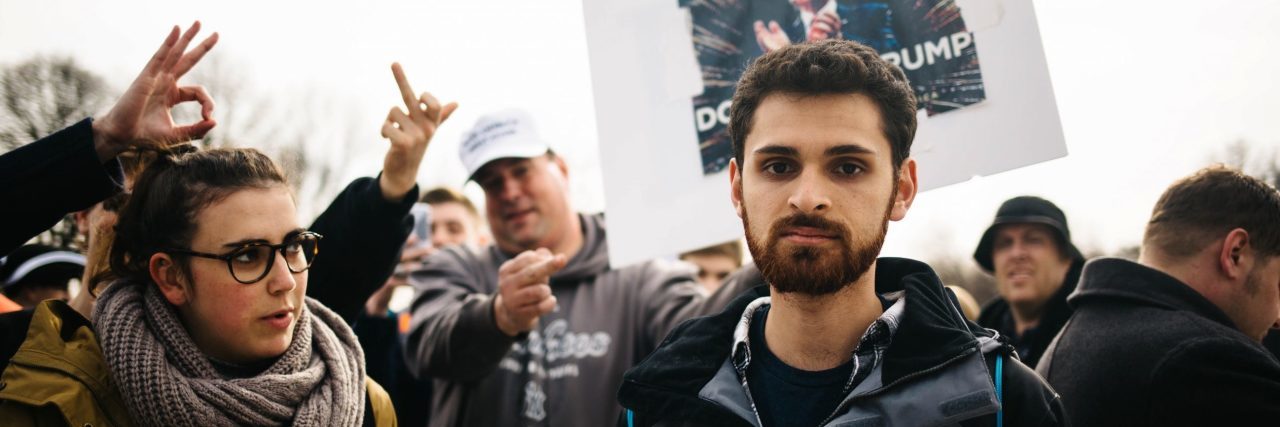It’s been months since I felt the literal suicidal despair of the acknowledgment of a Donald Trump presidency. I didn’t know how to express how I was feeling, so I wrote a zine called “Donald Trump (almost) ate my brain.” I tried to get my thoughts down in a coherent form and express them to others with the hope they would relate.
I’m a recovering anxiety-prone individual. Through imaginary conversations, I’ve learned how to tamp down the feelings of despair to a reasonable place. “Everything will be OK. You’ll survive. It’s unlikely there will be concentration camps for straight, white, male liberals.” It may seem I’m joking, but unfortunately, I’m neurotic.
In the time since the election of Trump, I’ve found myself stricken with my recurring depression (a frequent visitor for 25 years). I don’t find it surprising that I’d feel depressed about the current situation in the United States. My dejection and suicidal ideation have taught me to be empathetic. I hate to see human beings in pain or struggling — especially those who aren’t like me. Besides, I have people of color and women in my life — two of the many groups with whom Trump and his followers have issues.
I’d love to see myself on the streets fighting with Antifa against neo-Nazis. I’d love to be at every protest — I’ve attended a few. Living in a liberal state with Democratic Reps and Senators, I don’t know what else I can do. Sometimes I’m more conservative than my congressperson. He sends out weekly email updates, I read them and nod my head in agreement, but other times think, “Woah, man. Calm down!” He’s pissed but in a controlled, professional manner. I’ve become lethargic.
I read articles and comments on social media about how everyone should be out on the streets and fighting against racial oppression. According to some Twitter users the time in which we now live is no different than the Civil Rights era of the 1960s. A post on Twitter stated something to the degree of: “You’d stand up back then, right? Why not do so now? You’re responsible for racism and what white supremacists are doing if you don’t take a stand against it.”
I felt guilty upon reading that. I don’t want to be complicit in racism. I want to stand up and protest. But what do I do when I contemplate death and wishing I didn’t have to exist because of the constant assault on my mental health by my depression? Some mornings it’s tough for me to get out of bed. Most days being at work leaves me with too much time to think about how miserable I am. How do I fight against oppression in the midst of this?
It’s quite possible that the entire system of government in the United States is bigger than any one of us. We can try to get our voices out there. Yet what does it mean to sound off on social media or protest or call my representative whose feelings and beliefs mirror my own? All this is speaking into a void.
If you’re not feeling up for radical activism, or your current environment doesn’t invite it, but you want to take part in fighting against injustice, there are options. One is to reach for your wallet and chip in some money to a worthwhile cause. Another possibility is volunteering for a non-profit. I write for a depression awareness group and that makes me feel as though I’m doing something worthwhile. Donating money, volunteering — these are the things I do when there are waves of despair crashing in on me due to our current political situation.
If nothing else, it’s enough to spread a kind word. When I read the news I want to scream, “Why can’t we all be nice to each other?” and then I realize that’s all I can do: show kindness and empathy while spreading that message in conversations and my writing. That includes being kind to myself: I need to take care of me and know it’s OK to not feel guilty for doing so.
It’s been a year since the election. It’s been a time of hate and hurt, despair and depression. Some may think I’m being a “sensitive snowflake.” But I want people to treat others how they would like to be treated. If nothing else, I’d love to get someone to ask him or herself, “How will my actions affect others?”
I was able to find some ways to help with my mood. I made some goals back in April — I needed something to distract my mind from feelings of helplessness. I’m doing my best to follow through with them: write more, submit that writing for publication, do more public speaking and share my story with others.
If anything good has come from this, it’s that I’ve become more focused on spreading a message of compassion and empathy. There’s value in helping people through their depression, anxiety and suicidal thoughts. If people are so low they can’t even function, there’s not much hope of changing things for the better. And right now we could all stand to have some hope and change.
Editor’s note: This story reflects an individual’s experience and is not an endorsement from The Mighty. We believe in sharing a variety of perspectives from our community.
If you or someone you know needs help, visit our suicide prevention resources page.
If you need support right now, call the National Suicide Prevention Lifeline at 1-800-273-8255, the Trevor Project at 1-866-488-7386 or reach the Crisis Text Line by texting “START” to 741-741.
Photo by Michael Ramey on Unsplash

